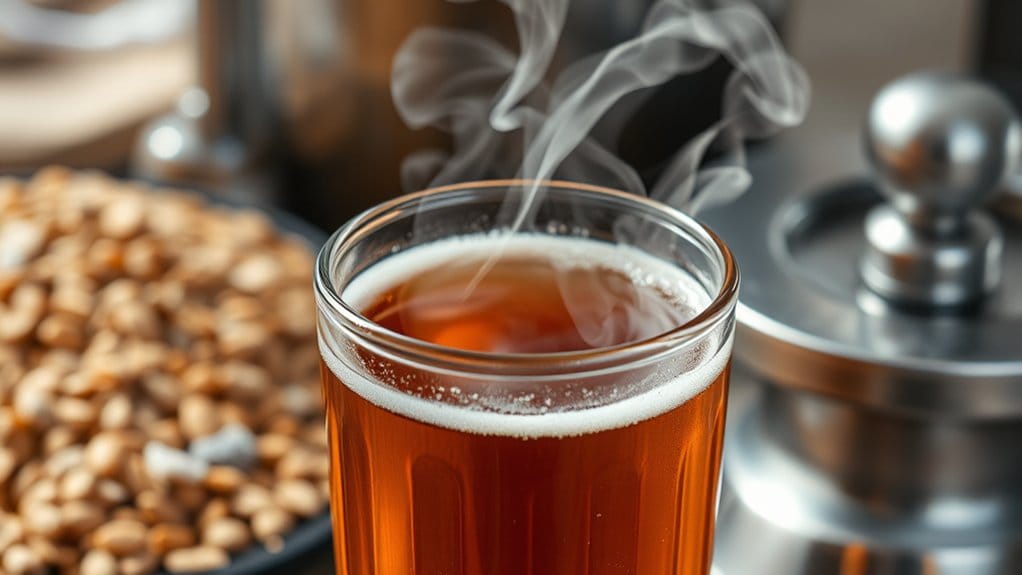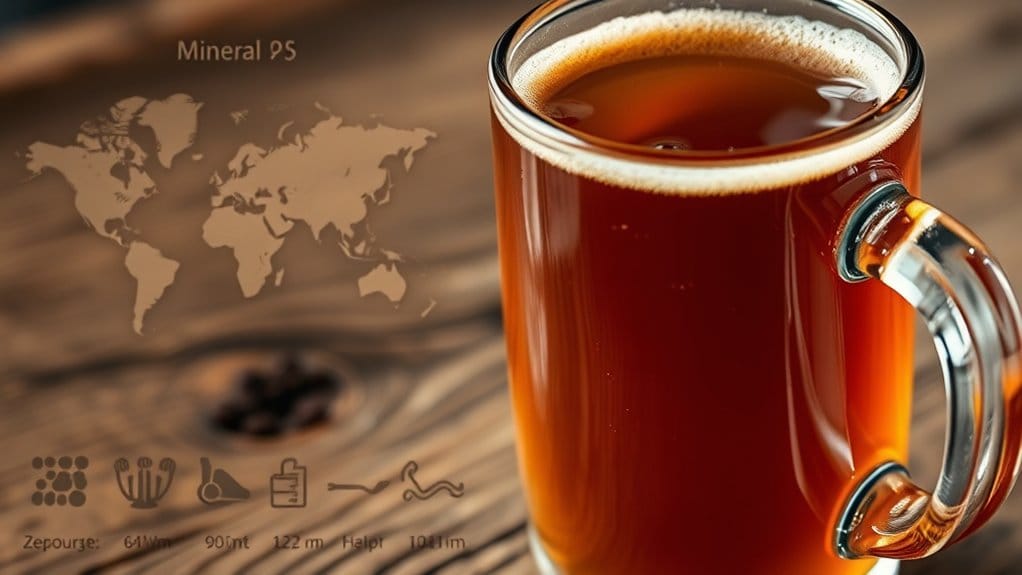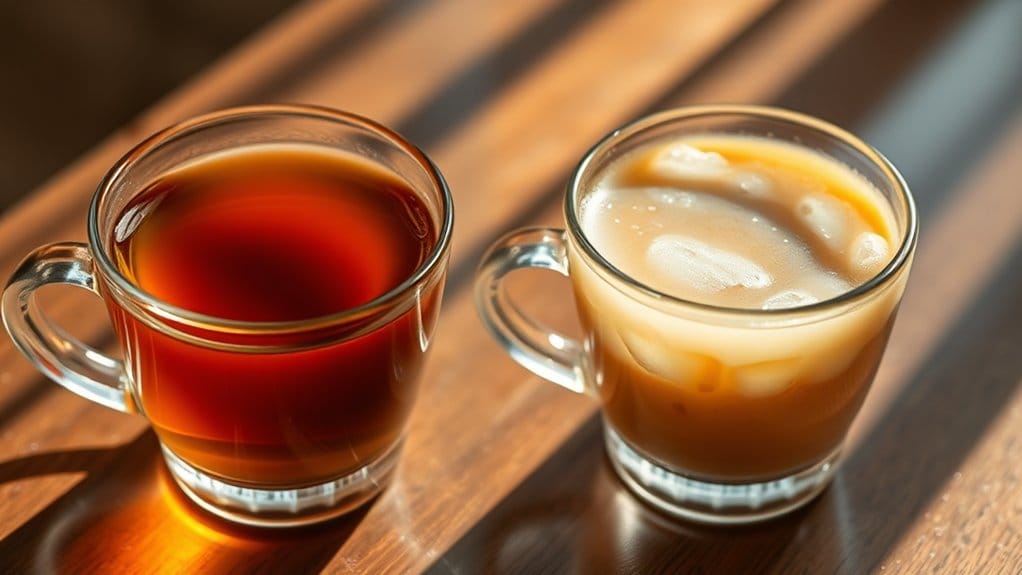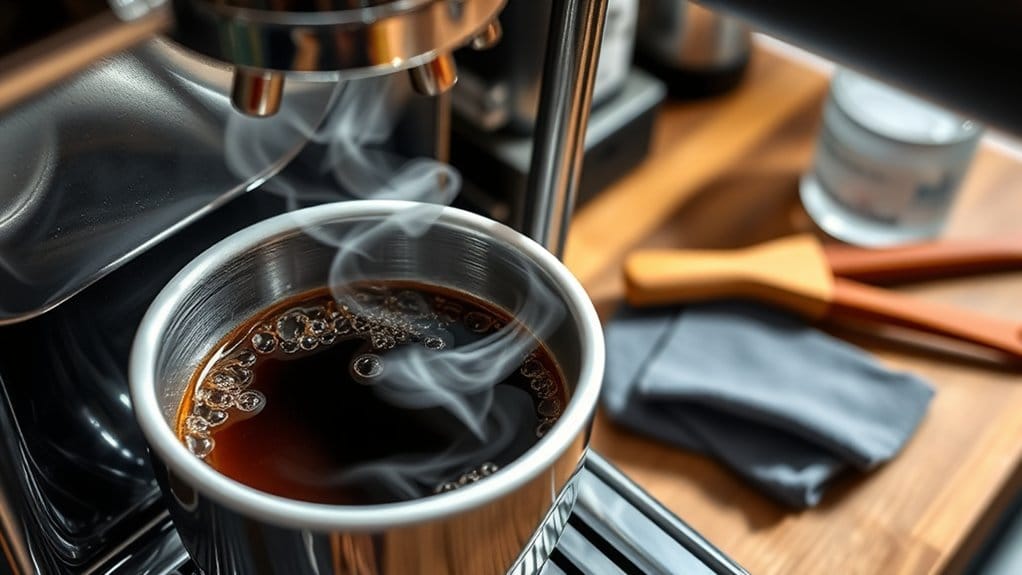Physical Address
304 North Cardinal St.
Dorchester Center, MA 02124
Physical Address
304 North Cardinal St.
Dorchester Center, MA 02124

Hard water messes with your brew’s flavor as it’s full of minerals like calcium and magnesium. These minerals can mute the brightness and make your coffee taste flat or even bitter. Imagine a cup of coffee that’s supposed to sparkle but instead feels heavy and dull! Finding the right balance in water hardness, around 50 to 175 ppm, really brings out those delicious fruity notes. Stick around, and you’ll uncover more tips for brewing your perfect cup!

When you think about brewing a great cup of coffee, you mightn’t immediately consider the water you use. But trust me, it’s crucial!
Water hardness, which refers to the concentration of minerals like calcium and magnesium, plays a big role in how your coffee tastes. If your water is too hard, you might end up with a muddy, chalky brew that lacks character. On the flip side, soft water can leave your coffee tasting thin and overly acidic. Mineral presence influences flavor extraction and expression, making it essential to strike the right balance. The presence of temporary hardness can affect potential scaling, further impacting your brewing experience.
The Specialty Coffee Association suggests keeping your water hardness between 50 to 175 ppm for ideal flavor.
Water plays a crucial role in brewing coffee, but it’s the minerals that truly shape the flavor profile you’ll savor in your cup.
Think of potassium as your coffee’s best friend—it balances acidity and sweetness, adding a smooth touch. Additionally, understanding water mineralization is crucial for brewing quality coffee, as it can significantly enhance flavor complexity. The influence of water quality during fermentation can also enhance the overall flavor, ensuring that each brew brings out the best characteristics of the coffee beans. Notably, sustainable practices in coffee farming can further ensure a richer taste, as they promote healthier cultivation conditions.
Calcium takes the stage by effectively extracting flavors, giving your brew that fuller body you crave. With just the right amount, it can improve the cup without turning chalky.
Then there’s magnesium, which brings out those delightful fruity notes and prevents bitterness from stepping in.
When you combine these minerals, like a well-rehearsed band, they create a harmonious and tasty experience.

Imagine brewing a cup of coffee that sparkles with brightness and tangy complexity—sounds delightful, right? But if you use hard water, that bold flavor might get lost.
Higher calcium and magnesium levels can extract more flavors, but they often drown out the acidity you love. Think of it like singing in a choir with someone too loud; it can mute the best voices. Moderate coffee consumption can help enhance cognitive function, but hard water could hinder that vibrancy in your brew.
In hard water, your coffee might taste flatter and duller, lacking that zing. With excessive hardness, the delicate fruity notes get overshadowed by bitterness, ruining your ideal brew. This is why managing water hardness is essential for a more vibrant taste experience.
You want a lively cup, not a one-dimensional snooze-fest, so aim for water hardness between 60 and 120 ppm for a balanced cup full of personality!
While you mightn’t give much thought to the minerals in your coffee, they play a huge role in the flavors you experience with each sip.
Calcium adds a creamy, rounded mouthfeel, but too much can make your coffee taste flat. Then we’ve magnesium, which helps bring out fruity flavors, adding a lovely complexity to your brew. It keeps bitterness at bay, letting sweetness shine through.
Don’t forget about sulfates; they can boost acidity but, if overused, leave your cup tasting chalky.
Finally, bicarbonates can dull your coffee’s brightness; no one wants a flat cup of joe, right?

After examining how minerals influence your coffee’s taste, it’s natural to contemplate what they can do to your brewing equipment.
Hard water can cause limescale buildup in your machines, especially in coffee makers and espresso machines. This bothersome scale clogs internal parts, leading to trouble with water flow and temperature control. Ever waited too long for that perfect cup? That might be scale’s fault!
If you don’t tackle this issue regularly, you could face costly repairs down the line. It’s crucial to clean and descale your equipment often.
Choosing the right water for your brewing can feel as crucial as picking the perfect coffee beans. You want to aim for water hardness between 50-80 ppm CaCO3. Think of it as the sweet spot!
Too soft, below 30 ppm, and you’ll notice a dull cup. But don’t go crazy and exceed 80 ppm, either. You risk over-extracting those bitter notes. Important minerals, like calcium and magnesium, help bring out bright flavors, whereas bicarbonates balance acidity.
You can test your water hardness at home using DIY kits or simple soap tests. Immerse a test strip in water, or mix warm water with liquid soap and observe suds for a rough estimate.
Bottled water can be convenient, but it often carries unwanted minerals or additives that might compromise your brew’s flavor. You’re usually better off using filtered tap water for a more consistent and cost-effective brewing experience.
Yes, hard water affects tea flavors. You’ll notice bitterness, dull aromas, and weaker brews. Softer water preserves the delicate notes and improves the overall experience, making your tea more lively and enjoyable.
Yes, you can mix hard and soft water for brewing. This blending helps balance mineral content and pH, enhancing enzyme activity and flavor. Just make sure you monitor ion levels to achieve your desired profile!
You can spot scale buildup in your coffee maker by observing reduced water flow, slower brewing times, unusual sounds, incomplete brewing, and visible deposits. Regular maintenance helps prevent these issues and keeps your coffee tasting great.